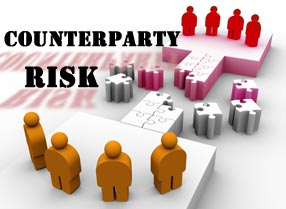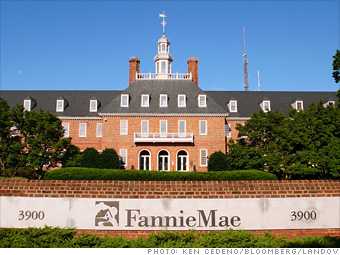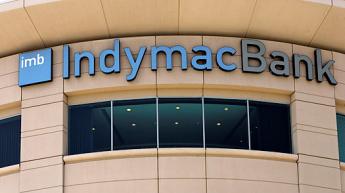Related Topics
American Finance After Robert Morris
Robert Morris can be fairly said to have made the American Revolution possible.
Personal Finance
The rules of financial health are simple, but remarkably hard to follow. Be frugal in order to save, use your savings to buy the whole market not parts of it, if this system ain't broke, don't fix it. And don't underestimate your longevity.
Whither, Federal Reserve? (2)After Our Crash
Whither, Federal Reserve? (2)
Banks: Fragile and Dangerous

|
| Counterparty Risk |
A bank can't function without deposits, and it can't function unless it can sell shares. So a bank will collapse if there is a run, or if the price of its stock declines severely; public opinion has a lot to do with the success of a bank. What's more, banks have a lot of dealings with each other, so a panic can quickly spread from one bank to another. That's known as counterparty risk. The laws require a bank to maintain a certain ratio of equity to assets, which is to say a ratio of the collective worth of its stock compared with the collective worth of its outstanding loans. The intent of this rule is to make sure the stockholders lose every dime of their investment in the bank before the depositors lose anything. Facing the total loss of their investment in almost every serious difficulty, bank stockholders are very twitchy.

|
| Fannie Mae |
If the bank is doing poorly for some reason, the stockholders get wind of it, and the price of the stock declines as stockholders sell out. The effect of this is to bring the "capital ratio" below the required level, and the authorities will require the bank to sell more stock. That will, in turn, dilute the value of the stock of the existing shareholders, decreasing the stock value. So the effect of a sharp drop in share prices will have almost the same risk to the bank as a run on the cash by the depositors because now the shareholders will sell more stock in the hope of getting out before it declines further in value. This happened in 2008 with the stock of Fannie Mae, which dropped from about $70 a share to $10 in a few weeks, prompting the Federal Reserve to offer to loan cash reserves, and if necessary to buy the stock. After that, it sent investigators to measure the solvency of Fannie Mae.

|
| Indy Mac |
This historic episode illustrates the valuable role of the stock market in sensing trouble before regulators are aware of it, and helps explain to Congressmen who want to pass abusive legislation that "The stock market won't let you do that." A week or so earlier, Senator Charles Schumer (D, New York) had made public a letter expressing his concern about IndyMac, another large bank, with the immediate result that there was a run on that bank which made it collapse. So, not only are there banking situations which Congress does not dare meddle with -- there are even situations which the Senate Banking Committee does not dare talk about openly. Naturally, this sort of situation wounds the egos of Congressmen, but a number of left-leaning and high-handed foreign countries have in the past nationalized their banks, with disastrous results. When a bank gets to a certain size, it is as fragile as a land mine. And just as dangerous to tamper with.
Originally published: Saturday, July 26, 2008; most-recently modified: Sunday, July 21, 2019